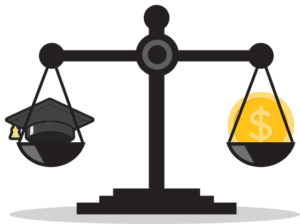Can You Refinance Student Loans?
For many of the 44 million young Americans saddled with significant student loan debt, the process of investigating whether to refinance student loan obligations can make sense. From the outset, it is important to understand that student loan refinancing and student loan consolidation are not the same thing.
Whereas student loan consolidation simplifies the monthly payment process through one streamlined payment while often simultaneously lowering the amount of the payment, student loan refinancing involves securing a new loan from a private refinancing company that is unrelated to the government, usually at a lower interest rate and more favorable terms.
Let’s take a look at how student loan refinancing works and whether it is a good idea to pursue it in the instances of both Federal student loan obligations and private student loans.

How Does Refinancing Student Loans Work?
With aggregate student loan debt approaching 1.25 trillion dollars, a number of private student loan refinancing companies have sprung up as a partial solution for those individuals who are afflicted with highly burdensome student loan debt. Through the process of student loan refinancing, borrowers can often secure a lower interest rate that can ultimately result in thousands of dollars in interest expense savings over the life of the loan.
These savings can be allocated to help pay down the debt faster, though many borrowers often choose to extend the term of the loan in an effort to lower the monthly payment. Since student loan refinancing companies can refinance both Federal student loans as well as private student loans, it is important to weigh various considerations in each scenario.
ABC

Refinancing Private Student Loans
The decision as to whether to refinance private student loans is generally an easy one. Applying to a number of different refinancing companies within a 30-day period will typically result in favorable refinancing with a lower interest rate and more favorable terms without any serious repercussions.
Submitting multiple applications within a short period of time will likely result in only one “soft pull” on an individual’s credit report with minimal consequences. Meantime, the lower interest rate and improved cash flow that results from the reduction in interest expense and, in some instances, lower monthly payment, make the prospect of refinancing private student loans generally appealing.
Refinancing Federal Student Loans
With Federal student loans, the decision as to whether to refinance is not as clear. Federal Student loans frequently offer various income-driven repayment plans as well as loan forgiveness in certain circumstances, however, these potential benefits are lost following any refinancing. Since most student loan refinancing companies allow a potential borrower to check prospective interest rates, it makes sense to shop around and input appropriate variables into a student loan calculator.
In particular, Grad PLUS and Parent PLUS loans are attractive refinancing candidates given that their interest rates frequently approach 9%. For those borrowers with a healthy income and credit score, as well as the confidence to make consistent payments over the life of the loan, refinancing Federal loans can make sense. However, if the debt load is especially high and in the future it could make sense to pursue one of the various income driven repayment plans or loan forgiveness, it may be prudent to avoid refinancing federal student loans.


Pros and Cons of Refinancing Student Loans
One of the major benefits of student loan refinancing is that it will often lead to a lower interest rate and significant savings in interest expense over the life of the loan. Additionally, the simplicity of making only one monthly payment instead of payments to various lenders also makes repayment easier. However, private lenders offering student loan refinancing often have strict eligibility requirements centered around sufficient income and creditworthiness.
This can be worked around with the inclusion of a co-signor who meets these standards, and many lenders will release a co-signor after three or more years of timely, consistent payments on the refinancing. Still, it is important to remember that once a refinancing is performed, the repayment plan gets locked in for the duration of the loan – gone is the flexibility of considering any Federally sponsored income repayment plans or loan forgiveness.
Even though some refinancing companies offer forms of forbearance and deferment during times of unemployment or other financial hardship, any concessions granted privately are likely to fall short of those that would have been available through the Federal government.
Get Debt Relief
Speak with licensed debt specialists dedicated to guiding you toward financial stability every step of the way.

Ready To Get Started?
See if you qualify for debt relief. Get a Free savings estimate to see how quickly you can be debt free.
Embrace financial freedom with our tailored solutions, expert guidance, and unwavering commitment to your success.
Experienced Professionals
Our experienced team has helped thousands of clients successfully eliminate debt and regain financial freedom.
Customized Solutions
We know every financial situation is different, so we design personalized debt relief plans to fit your specific needs and goals.
High Success Rate
Our proven debt relief strategies deliver real results. With a strong track record of success, we help clients achieve lasting financial stability.
Confidential Consultation
Your privacy is our priority. All debt relief consultations are 100% confidential and handled with the highest level of discretion.
Explore other blogs











